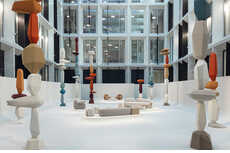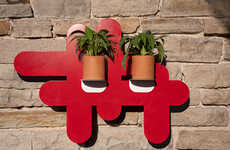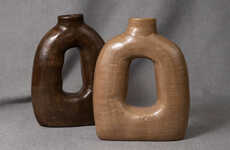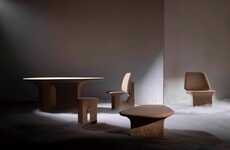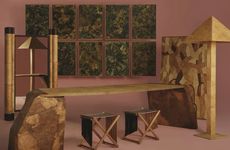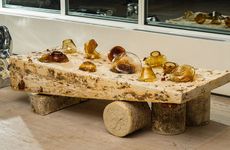
Fernando Laposse Creates Totomoxtle as an Example of Circular Economy
References: fernandolaposse & dezeen
The importance of adopting a circular economy is stressed by Mexican designer Fernando Laposse and his imaginative marquetry designs. Dubbing his product 'Totomoxtle,' the material utilizes "the colorful husks of heirloom corn species," with the hope of "restoring vital biodiversity."
There are a few uses of Fernando Laposse's Totomoxtle. The creation process includes peeling the corn husks from the cob and ironing them flat. Thereafter, they are glued on a textile and laser cut. With the pieces, Laposse creates his bespoke marquetry designs. The end result is a variety of unique textures and colorings that are, without a doubt, absolutely captivating.
These can be used to supplement the aesthetic of furniture, lamps, tables, and so on. In addition, the marquetry designs can be used as wall or floor coverings.
There are a few uses of Fernando Laposse's Totomoxtle. The creation process includes peeling the corn husks from the cob and ironing them flat. Thereafter, they are glued on a textile and laser cut. With the pieces, Laposse creates his bespoke marquetry designs. The end result is a variety of unique textures and colorings that are, without a doubt, absolutely captivating.
These can be used to supplement the aesthetic of furniture, lamps, tables, and so on. In addition, the marquetry designs can be used as wall or floor coverings.
Trend Themes
1. Circular Materials - Exploring the opportunity to use unconventional materials to create sustainable and eco-friendly products, leading the way to circular materials and design practices.
2. Sustainable Design - Developing innovative and environmentally friendly design practices that can be applied to a variety of industries, improving the quality and sustainability of products.
3. Nature-inspired Products - Creating products that are inspired by nature and incorporate sustainable and unconventional materials into the design process to address issues of environmental sustainability.
Industry Implications
1. Furniture Manufacturing - Leveraging circular materials and sustainable design practices to create eco-friendly furniture and home decor products.
2. Interior Design - Incorporating nature-inspired products and circular materials into interior design practices to promote sustainability and environmentally-friendly practices.
3. Renewable Materials - Developing renewable materials and products from unconventional and natural sources that reduce waste and promote environmental sustainability.
4
Score
Popularity
Activity
Freshness


